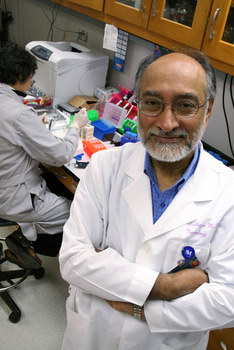Newly Discovered Gene Mutation Linked to Nerve Diseases
Discovery may provide new understanding of disorders associated with muscle weakness
 |
|
| Teepu Siddique, MD, Les Turner ALS Foundation/Herbert C. Wenske Professor in the Feinberg School of Medicine Davee Department of Neurology and Clinical Neurosciences. |
Researchers from the Northwestern University Feinberg School of Medicine have identified mutations in the gene for TRPV4 that cause two related degenerative motor nerve disorders, scapuloperoneal spinal muscular atrophy (SPSMA) and hereditary motor and sensory neuropathy type IIC (CMT2C).
These disorders cause progressive weakness of the limbs, breathing muscles and vocal cords. The Northwestern University researchers also established that TRPV4 is involved in homeostasis of intracellular calcium during axonal activity. As a result, this discovery has wider implications for understanding non-genetic neuropathies and motor axon degeneration.
Han-Xiang Deng, MD, PhD, associate professor of neurology, and Teepu Siddique, MD, the Les Turner ALS Foundation/Herbert C. Wenske Professor, both of the Davee Department of Neurology and Clinical Neurosciences and their colleagues published these findings in the online edition of Nature Genetics Dec. 27. Siddique is also a neurologist at Northwestern Memorial Hospital.
“Abnormally functioning TRPV4 receptors may drive excess calcium into neuronal extensions called axons,” said Siddique, who is also director of the Division of Neuromuscular Medicine at Northwestern’s Feinberg School of Medicine. “We think this may be a mechanism by which axons of motor or sensory neurons may be damaged in a variety of neurological conditions.”
The discovery adds a new dimension to scientists’ understanding of the way motor nerves innervate muscle function. “We know an electrical impulse starts from the spinal cord and goes out to the muscle,” Deng said. “That is how things have been understood. Now we have this receptor that may modulate axonal activity, so, if it is not functioning properly, there may be nerve damage.”
Sididque noted that because TRPV4 receptors are activated by pressure, amongst other modalities, their malfunctioning could also be relevant to compression neuropathies. He further said the role of TPRV4 in the pathophysiology of other spinal muscular atrophies and amyotrophic lateral sclerosis (ALS, also called Lou Gehrig disease) should also be investigated. ALS is a progressive and usually fatal neurodegenerative disease that affects nerve cells in the brain and spinal cord.
Robert Delong, MD, now professor emeritus of pediatrics at Duke University School of Medicine, and Siddique, first identified scapuloperoneal spinal muscular atrophy in a large New England family of French-Canadian origin in 1992. In 1994, Peter Dyck, MD, professor of neurology at the Mayo Clinic, identified the related disorder hereditary motor and sensory neuropathy type IIC in an American family of English and Scottish descent. In this new study, gene mapping and sequencing of DNA from these two families revealed the key TRPV4 gene mutations.
Other investigators who contributed to this study include Christopher Klein, MD, and Peter Dyck, MD, of the Mayo Clinic, E. Tessa Hedley-Whyte, MD, of Massachusetts General Hospital and Jianhua Yan, MD, Yong Shi, MD, Marco Martina, PhD, and Faisal Fecto, MD, of the Northwestern University Feinberg School of Medicine. The research was supported by the National Institute of Neurological Disorders and Stroke, the Les Turner ALS Foundation and others.






